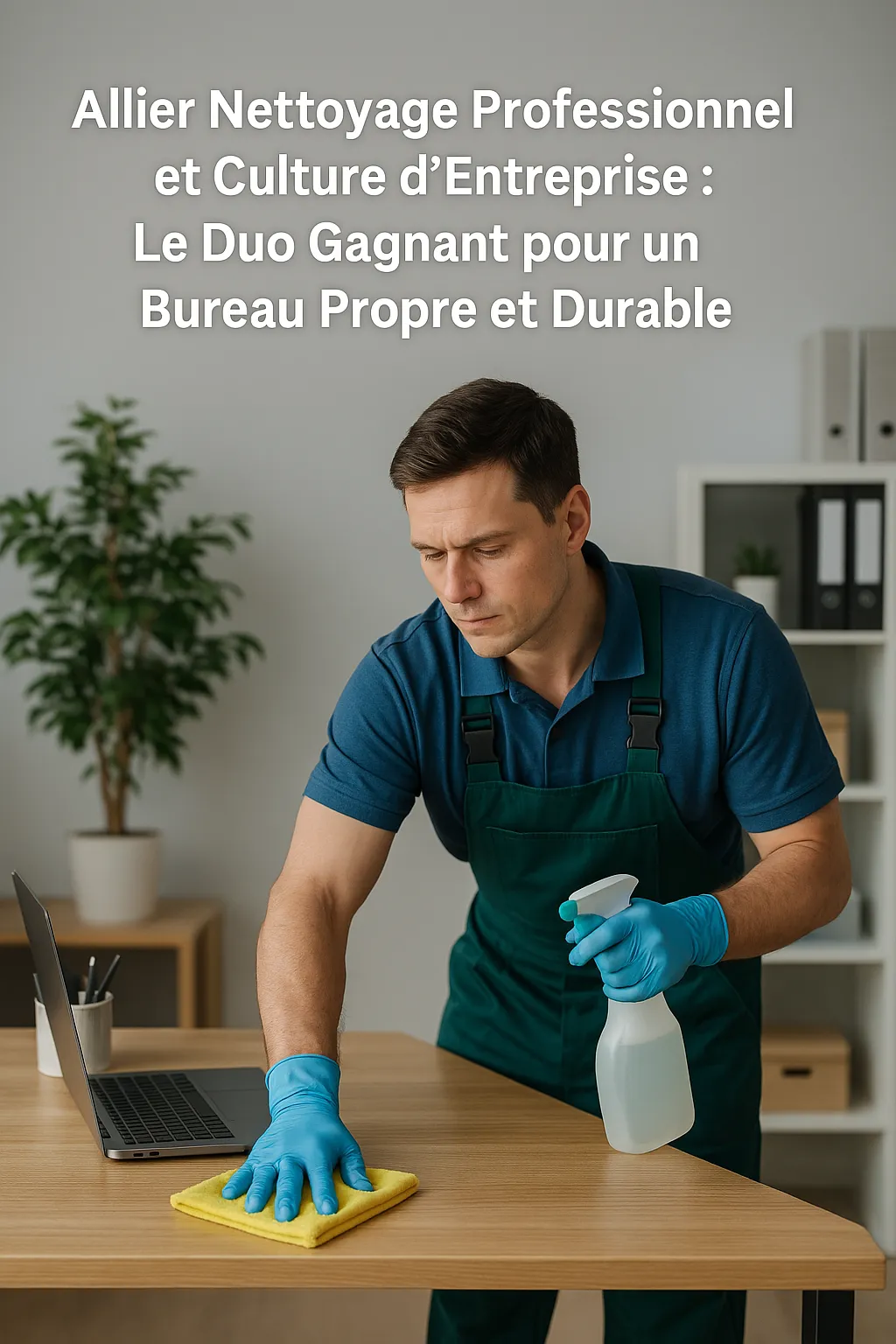Professional Cleaning and Corporate Culture: The Winning Duo for a Clean Office
To create synergy between cleanliness and performance, companies must adopt a holistic and structured approach. It all starts with an accurate assessment of each workspace’s specific needs. Whether open-plan offices, collaborative spaces, or restricted areas, each environment requires tailored solutions. Close collaboration with professional cleaning experts helps define customized cleaning protocols that align with both hygiene standards and the company’s internal values.
Involving employees in this process also strengthens their sense of belonging. Raising awareness about the importance of cleanliness encourages positive habits — keeping desks organized or reporting neglected areas becomes second nature. These daily gestures foster a culture based on mutual respect and shared responsibility.
Integrating cleaning into the company’s workplace wellness strategy is another major advantage. It positions the company as a place that values health and comfort. The message is clear: every detail matters. This attention to the work environment often improves employee retention and contributes to a more harmonious atmosphere and higher performance. In short, linking cleanliness and company culture means choosing a more human, engaged, and forward-thinking organization.
The Importance of a Clean Work Environment
To maintain high standards, it’s essential to establish a clear and consistent cleaning routine. This should be part of daily company management — for example, a detailed task schedule, identifying critical areas that require regular monitoring, and maintaining open communication between internal teams and cleaning providers. This level of structure ensures consistent cleanliness and peace of mind for all employees.
Involving staff in this process also helps build long-term habits. When employees understand their role in maintaining cleanliness — such as tidying their workspace at the end of the day or reporting issues — they contribute to a more collaborative company culture. This sense of shared responsibility often strengthens team cohesion.
It’s also important not to view cleaning as a mere logistical necessity. It is, in fact, a strategic asset. A clean workplace promotes a positive atmosphere, reduces health risks, and enhances the company’s image and attractiveness. It reflects attention to detail that both employees and visitors appreciate. Ultimately, investing in cleanliness is an investment in performance, health, and long-term reputation.
Lessons from Japan: Applying the 5S Method for a Clean, Efficient Office Culture
To ensure lasting success with the 5S method, employee involvement is crucial. Collective participation is the key — every team member should understand not only the steps but also the practical benefits they bring to daily work life. Regular training sessions, visual reminders such as posters and guides, and periodic audits help reinforce these practices over time.
Leadership also plays a decisive role. When managers actively embrace and model 5S principles, they send a powerful message about the importance of maintaining an organized and clean workspace. This engagement fosters a culture of continuous improvement, where everyone feels responsible for order and cleanliness.
Moreover, the 5S method isn’t limited to industrial settings — it can be applied effectively in offices, retail spaces, and even coworking environments. It not only keeps spaces clean but also improves safety, efficiency, and reduces stress linked to clutter.
In summary, adopting the 5S method means investing in smoother operations, a healthier workplace, and a more motivated team. When properly implemented, it becomes a true driver of performance and collective well-being.
The Benefits of Regular Professional Cleaning
One major advantage lies in the flexibility of professional cleaning services. Cleaning companies adapt their schedules and services to meet the specific needs of each organization — early mornings, evenings, or weekends — minimizing disruption to daily operations. This flexibility is particularly beneficial for facilities open to the public or operating around the clock.
Hiring professionals also enhances a company’s image in the eyes of visitors, partners, and clients. Clean, well-maintained offices reflect seriousness, rigor, and professionalism, often positively influencing how clients perceive product or service quality.
Additionally, outsourcing cleaning ensures compliance with health and environmental standards. Many professional cleaning firms now prioritize eco-friendly products and sustainable practices. By choosing a responsible provider, companies actively reduce their environmental footprint and align with growing expectations around social responsibility.
In short, entrusting cleaning to qualified professionals means choosing a healthy, high-performing, and positive environment for everyone involved.
Strategies for Integrating Cleaning into Corporate Culture
Managers play a key role in embedding cleanliness into corporate culture. They must lead by example, adopting responsible habits themselves. Their visible commitment motivates teams to do the same, giving legitimacy to collective efforts. Corporate culture begins with leadership behavior.
It’s also wise to integrate cleanliness into daily management routines — for instance, including quick end-of-day checks or scheduling short weekly cleanup sessions. These small, consistent actions can make a big difference in the overall condition of workspaces.
Measuring results is equally important to maintain momentum. Internal audits or employee satisfaction surveys can help identify areas for improvement and demonstrate that cleanliness is taken seriously. This continuous improvement mindset ensures long-term success.
By applying these strategies, cleanliness naturally becomes part of the corporate culture — contributing not only to a pleasant workspace but also to a climate of respect, engagement, and performance.
Success Stories: Companies That Combine Cleanliness and Culture
Many organizations have successfully integrated cleanliness into their core values. In the healthcare sector, for example, some hospitals now embed strict cleaning protocols into their internal culture — going beyond regulatory requirements. This discipline not only ensures patient safety but also builds trust among staff and visitors.
In the hospitality industry, major hotel chains like Accor have made cleanliness a central pillar of their brand promise. Their teams receive regular training in the latest cleaning techniques, and frequent quality audits ensure high standards. This commitment enhances brand reputation while guaranteeing comfort for guests.
These examples show that cleanliness should not be viewed as a mere operational task, but as a strategic pillar of corporate culture. By making cleaning a driver of engagement, well-being, and performance, companies invest in their human capital and reputation — a sustainable, winning approach aligned with modern expectations of workplace quality.
Innovations in the Professional Cleaning Industry
Data analysis now plays a central role in the cleaning industry. With smart sensors and the Internet of Things (IoT), it’s possible to collect real-time data on space usage, dirt levels, and product consumption. These insights allow for precise, proactive adjustments, reducing waste and boosting overall service efficiency.
Artificial intelligence is also being adopted to anticipate cleaning needs based on usage patterns. Algorithms can, for example, recommend optimal cleaning schedules by analyzing building traffic data. This predictive approach ensures consistently clean environments while conserving resources.
Meanwhile, staff training is evolving as well. Cleaning professionals are now required to master new technologies and understand the environmental impact of their work. This shift promotes greater professionalism and enhances service quality.
By embracing these innovations, cleaning companies are no longer just maintaining spaces — they are becoming strategic partners in promoting workplace performance, well-being, and sustainability.
Choosing the Right Professional Cleaning Service
It’s important to compare pricing and contract details carefully. A good provider should offer clear, transparent value with no hidden fees. Requesting multiple detailed quotes helps evaluate included services and available options while avoiding future surprises.
Transparency and communication are also key. A reliable cleaning company should be responsive and attentive to client needs, ideally offering a dedicated contact person and regular service reports.
Lastly, consider the provider’s environmental commitment. In today’s sustainability-focused world, choosing a company that uses eco-friendly products strengthens your organization’s responsible image. Such partnerships demonstrate a commitment to integrating strong values into workspace management.
In conclusion, selecting the right professional cleaning service requires a thorough evaluation of reputation, compliance, flexibility, communication, and values. By taking the time to assess these factors, you ensure a dependable, efficient service aligned with your company’s performance and culture goals.
Towards a Cleaner and More Engaged Company
Combining professional cleaning with corporate culture is a winning strategy for any organization. A clean, well-maintained workplace boosts productivity, reduces stress, and enhances employee satisfaction. Additionally, integrating sustainable cleaning practices strengthens the company’s commitment to social responsibility and environmental protection.
To take it further, adopting proven methods such as the 5S system helps establish an effective routine. When combined with professional cleaning services, this fosters a positive work atmosphere. Embedding cleaning into corporate culture also motivates employees and instills a sense of pride. Many companies that have implemented these practices successfully report tangible benefits: healthier teams, improved well-being, and a stronger brand image.
In conclusion, investing in office cleanliness and hygiene is not just about aesthetics. It is a true management strategy. A clean and sustainable environment enhances operational efficiency and demonstrates a strong commitment to employees and society. Ultimately, it is a profitable investment that delivers concrete results: higher productivity, increased satisfaction, and a strengthened reputation.




